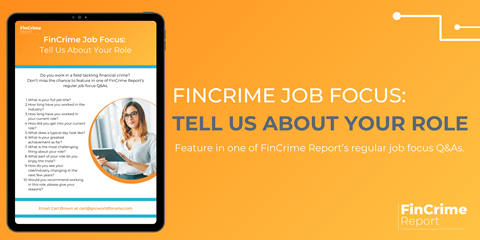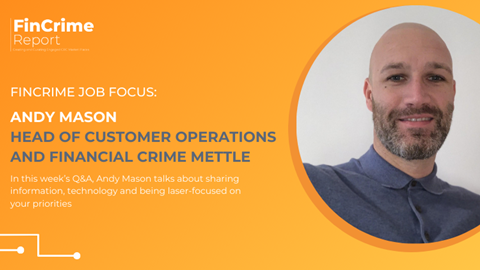In our Q&A this week, Andy Mason talks about sharing information, technology and the importance of being laser-focused on your priorities
What is your full job title?
Head of Customer Operations & Financial Crime at Mettle.
How long have you worked in the industry?
I have worked in banking for nearly 17 years, 10 of which have been in FinCrime. I started out in operating model design for financial service companies and quickly found that I had a talent for understanding how things work, how things could work and helping to make that happen.
I spent several years as a Lean Six Sigma Black Belt, which gave me a data driven toolset that is still valid to this day. During this period, I had the opportunity to work with businesses such as Toyota, Motorola, Jaguar Land Rover to innovate financial services based on data-driven approaches.
I transitioned from ‘improvement’ into financial crime. I helped a FinCrime unit solve some pretty challenging problems in the US and since then have held roles managing FinCrime teams in multiple global locations in all sectors from retail banking to investment banking. I made the move into FinTech around four years ago.
How long have you worked in your current role?
Nearing six months.
How did you get into your current role?
Prior to joining Mettle, I was the Head of Financial Crime for Bó, NatWest Group’s retail digital bank, where I was responsible for designing and implementing the entire FinCrime framework from scratch. When Bó was retired just under a year ago, I was asked if I would like the opportunity to take on a broader role at Mettle, another one of NatWest Group’s innovation ventures.
What does a typical day look like?
Working in a FinTech start-up is incredibly varied and fast paced so no two days are ever the same, but an example day could be working with our marketing team to agree customer acquisition plans, Engineering to define how our FinCrime analytics environment should work, Product teams about the next feature, as well as my own teams to assess operational performance and customer experience improvements.
The best thing about my job is having the opportunity to be involved in everything that is integral to running a financial product; providing great customer experience, and reducing the potential harm that FinCrime can have for our customers and society in general.
What is your greatest achievement so far?
That is a tough question.
At Mettle, I think it would have to be doubling the customer acquisition capacity without eroding our risk position.
In my career, I’ve been very fortunate to have been involved in some great projects. My greatest achievement has to be building a real-time fraud profiling and AML transaction monitoring system that was able to interdict pre-payment authorisation if something looked suspicious. This system had a tangible impact on customer harm reduction, which is something I’m passionate about.
What is the most challenging thing about your role?
Time and prioritisation. Making enough time to ensure everything we do is high quality and customer focused, and delivered at pace, can be challenging. Operations and FinCrime are at the heart of any banking institution so there is a lot of demand for mine, and my team’s time.
Mettle is a start-up and moves very quickly, so finding mental and operational models and mechanisms to support how we work rapidly, without dropping anything, is critical.
To support that we must be laser focused on what our priorities are and ensure that the team is aligned so that we can focus on the right things at the right time.
What part of your role do you enjoy the most?
Innovation and harm reduction.
How we innovate to better serve and protect our customers is the thing that gets me out of bed in the morning. I have an insatiable desire to make things better, faster, smarter and I’m constantly challenging myself and the team to find new ways that we can reduce the harm caused by financial crime.
The other elements are more nebulous. There are a few key differentiators that I have noticed from my experience in large institutions versus FinTechs.
- § While large banks tend to focus on being compliant with regulation, FinTechs want to be compliant and, more importantly, reduce the harm that financial crime does to society.
- § More traditional institutions tend to split FinCrime into constituent pillars - AML, Fraud, Sanctions - whereas FinTechs deploy multi-skilled people to manage FinCrime risk holistically.
- § The level of collaboration across FinTechs is phenomenal when it comes to reducing financial crime. There is a common purpose and proactive desire to share intelligence and techniques to stop and catch the bad guys.
Those three factors contribute to a great culture that permeates all FinTech businesses, and it is really energising at a macro level.
How do you see your role/industry changing in the next few years?
Firstly, I see there being more and more collaboration across financial institutions – exploring what typologies are being seen and how they can be addressed, and actively sharing the rules/flags/attributes that indicate financial crime across the industry.
Taking that one step further – and we have already seen an example of this in the Netherlands – banks could share their data and leverage it at a country-wide or even global view of money flows. Payment and card schemes can play a huge role in helping identify bad actors as they have visibility of inbound and outbound payment data. If a not-for-profit organisation were able to harness this data and make it accessible to institutions to fight crime through an API, it would be incredibly powerful.
Secondly, and linked to the above, data analytics and new technology coupled with artificial intelligence will be game changers for how harm caused by financial crime is detected and addressed. This is where FinTechs can really lead the industry due to the technologies they are built upon and the quality of data they have in comparison to older institutions on legacy infrastructure.
Thirdly, app based banks are going to become the norm, which means that there are many potential features that can enhance security and mitigate risk. For example, how you operate your device is unique to you - the angle you hold the device at, the hand you use to type, how you type, how hard you press the keys, the geographic locations you use, the IP addresses you use - all of this data can be harnessed to make decisions on the FinCrime risk associated.
As the technology improves to process this information in nanoseconds, it will become much harder for successful FinCrime assaults to be executed.
Another example is data anomaly detection. As information-technology improves, it will be possible to identify activity that is outside of the norm in real-time. For instance, new patterns of money laundering will be spotted before they have been successful, allowing banks and financial services to protect their customers even better than before.
These changes require legislation and law enforcement so that financial services can operate differently. Gone are the days when banks will identify money laundering six months after it has happened, which really challenges aspects such as the SAR regime.
Finally, there will always be a necessity for human investigators. However, new technologies and data approaches means that human investigator time is value added as the level of false positives that have been the plight of FinCrime historically will be vastly reduced. It is a very exciting time!

Do you work in a field tackling financial crime? Don’t miss the chance to feature in one of Fincrime Report’s regular job focus Q&As.
We are looking for people who work in AML/CTF, fraud detection, threat intelligence and related legal and regulatory fields across a range of industries to tell us about their everyday job.
Just fill in a short Q&A and submit a photograph to be considered for inclusion. We want to feature people of all levels of seniority.
If you want to take part, email Carl Brown at carl@grcworldforums.com

























No comments yet